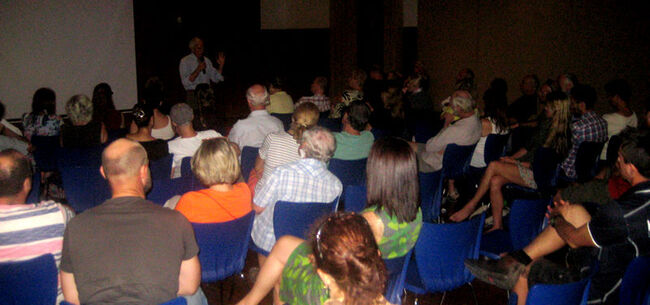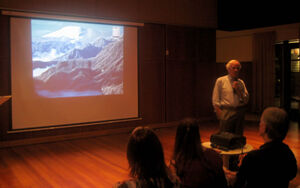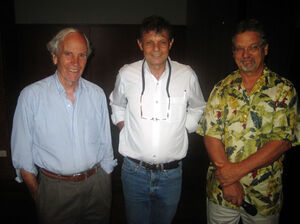
Tompkins: conservation = production
Wednesday October 9 2013
Tompkins: conservation = production
An audience of about 100 locals welcomed Doug Tompkins to the Port Douglas Community Hall on October 3, eager to hear from and arguably inspired by the world-renowned environmentalist’s 'make conservation a consequence of production' ideology.
An Ohio, US native, Mr Tompkins co-founded and operated two major, multimillion dollar global brands: outdoor clothing company The North Face (established 1964), and Esprit (established 1971).
After selling his stake in Esprit and leaving the business world in 1989, Mr Tompkins dedicated himself to environmental activism and land conversation. With wife Kristine, he has conserved over 2 million acres (8100 km2) of wilderness in Chile and Argentina, more than any other private individual.
Before addressing the audience at the Port Douglas Community Centre, Mr Tompkins toured the award-winning Botanical Ark, Alan and Susan Carle’s private ethno-botanical gardens.
Their guest was clearly impressed with the Carles’ efforts in tropical forest and plant conservation and education, and said he is looking forward to visiting the proposed, completed Mossman Botanical Gardens on his next tour of the region.
Speaking at the invitation of local resident and eminent environmentalist in his own right, Andre Leu, Mr Tompkins’ lecture explained how he, his wife, and their foundation strive to make conservation a consequence of production.
Along with the two DVD presentations that followed, Mr Tompkins illustrated the team’s achievements, future plans, and uncompromising philosophy.
The first DVD presentation showcased Campo Laguna Blanca, a 3000ha farm in Argentina purchased in 2007. Initially in serious need of attention, with poor infrastructure and eroding soil, Laguna Blanca is currently undergoing a dramatic transformation from industrial monoculture to organic ‘polyculture’.
As part of the makeover, terraces have been built, countering erosion and creating level fields. in which a variety of grains are grow. New orchards produce eleven species of fruit and nut, including peaches, pears, olives, dates and pecans. Sheep graze in restored native pastures, and the sheeps' winter feed is hay made from the grasses surrounding the orchards.
This ‘polyculture’ style of farming is an effective substantiation of making 'conservation a consequence of production', and the constant interaction between diverse crops, healthy soils, and native wildlife irrefutably improves farm yield.
Mr Tompkins’ second DVD presentation, ‘The next economy’ presented a compelling counter argument to American novellist, poet and environmental activist Wendell Berry’s pronouncement, "What is good for us is good for the world". Mr Tompkins and his foundation offer the alternative, "What is good for the world is good for us".
To close, he invited audience members to continue their own conservation work, no matter how small their efforts were; every effort counts.
Anecdotally, it was an inspirational couple of hours. Audience members noted the importance of recognising and addressing the various players in the eco-war and the global environmental crisis.
His website is at www.tompkinconservation.org.


